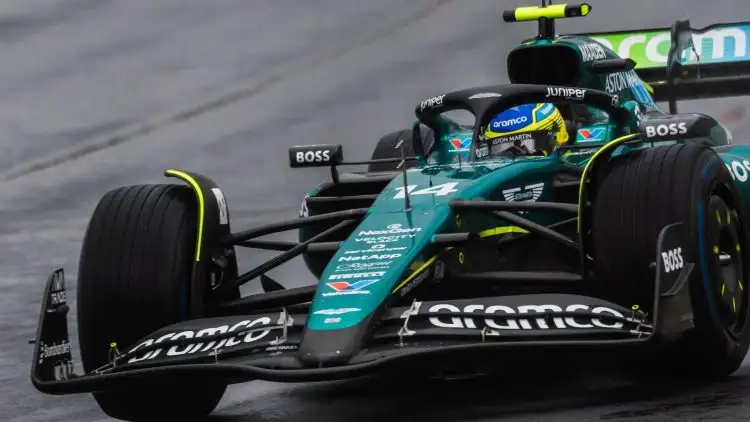
Just In:Fernando Alonso takes aim at Pirelli over not ‘top class’ tyres……
Fernando Alonso, two-time Formula 1 World Champion, has always been outspoken when it comes to the technical aspects of the sport. Recently, the Spaniard’s comments about Pirelli’s tires have sparked a lot of attention and raised some crucial questions about the tire supplier’s role in F1. In an interview, Alonso boldly stated that Pirelli’s tires were not “top class,” igniting a debate that has reverberated through the paddock and among fans. This statement, though critical, was not entirely unexpected given Alonso’s history of frank opinions and his deep understanding of the sport.
The Pirelli Dilemma: A Tire Supplier’s Role in F1
Pirelli has been the official tire supplier for Formula 1 since 2011. The Italian company inherited a complex task: to provide tires that not only meet the needs of a high-speed, high-performance sport but also adapt to the ever-changing regulations and demands of both the teams and the organizers. Over the years, Pirelli has been tasked with making tires that perform under extreme conditions while also managing tire degradation and wear, which are vital aspects of race strategies.
However, Pirelli’s tenure in Formula 1 has not been without controversy. Many drivers and teams have voiced concerns over the tire compounds, particularly regarding their performance, degradation, and unpredictability. Some argue that the tires often dictate race strategies more than driver skill or car performance, which detracts from the essence of racing. Others, like Alonso, have expressed dissatisfaction with the quality of the tires, particularly in terms of consistency, grip, and durability.
Fernando Alonso’s Critique: A Veteran’s Perspective
Alonso’s criticism of Pirelli’s tires stems from his extensive experience at the pinnacle of motorsport. Having driven for multiple teams, including Renault, Ferrari, McLaren, and now Aston Martin, Alonso has tested, raced on, and been forced to adapt to a variety of tire setups. His career has spanned multiple tire suppliers, and this long-term exposure gives him a unique perspective on how tire technology has evolved—or, as he suggests, stagnated—over the years.
In his latest remarks, Alonso stated that Pirelli’s tires “are not top class” and that they do not offer the level of performance expected in a sport like Formula 1. His frustration seems to stem from the inconsistency of tire performance across different race weekends. Alonso highlighted that in certain conditions, such as when the weather or track surface changes, Pirelli’s tires often fail to deliver optimal grip or wear characteristics. He believes that the lack of predictability in tire performance can influence the outcome of races, diminishing the role of driver skill in critical moments.
Alonso’s comments come in the wake of several races where tire degradation played a pivotal role in the outcome. For instance, at the 2023 Monaco Grand Prix, tire wear became a talking point when teams struggled to manage the life of their rubber under the harsh street circuit conditions. The issue was not exclusive to Pirelli’s performance but also stemmed from the broader concept of tire management, which is central to modern F1 racing.
The Tire Debate: Safety vs. Performance
One of the key challenges that Pirelli faces as the sole tire supplier is the balancing act between safety and performance. The FIA, the governing body of Formula 1, places stringent demands on tire durability to ensure driver safety at incredibly high speeds. This often results in tires that are designed to degrade in a controlled manner, preventing drivers from pushing their cars to the absolute limit for the entire race.
However, from a driver’s perspective, this balance sometimes goes too far, limiting their ability to extract the maximum performance from the car. Tires that wear too quickly or lack grip at certain temperatures can prevent a driver from fully utilizing their car’s potential. For a driver like Alonso, who thrives on maximizing every aspect of his machinery, this is particularly frustrating.
The issue of tire degradation has led to a debate within the F1 community about whether tire management has overshadowed pure racing. Pirelli’s tires, designed to degrade in a predictable manner, force drivers to manage their pace and conserve rubber over the course of the race. While this has made for some intriguing tactical battles, it has also reduced the number of wheel-to-wheel duels that many fans and drivers alike crave.
A Need for Change?
Alonso’s comments, though critical, are not an isolated incident. Many drivers have expressed similar frustrations over the years. In fact, when the new 18-inch tires were introduced in 2022, some drivers reported that the cars were more difficult to drive due to the increased size and changes in handling characteristics.
You may also like
Archives
Categories
- ABA
- Actor
- Actress
- Actress and singer
- Band
- Baseball
- Basketball
- Boxer
- Broadcasting corporation
- CCR
- cricketer
- Cyclists
- Dart
- Drummer
- Fictional character
- Football game
- Formula 1
- Golf
- Guitarist and songwriter
- Guitarists
- Gymnastics
- Hockey
- Ice hockey
- Marathon
- MLB
- Motocross
- MotoGP
- Motorcross
- Musician
- Musician and drummer
- NFL
- NHL
- NRL
- Racer
- Red bull Racing
- Rider
- Rock band
- Rugby league
- Simone Biles
- Singer and songwriter
- Songwriter and musician
- Sport commentator
- Tennis
- Texas longhorns
- Track and field athlete
- Uncategorized
Leave a Reply